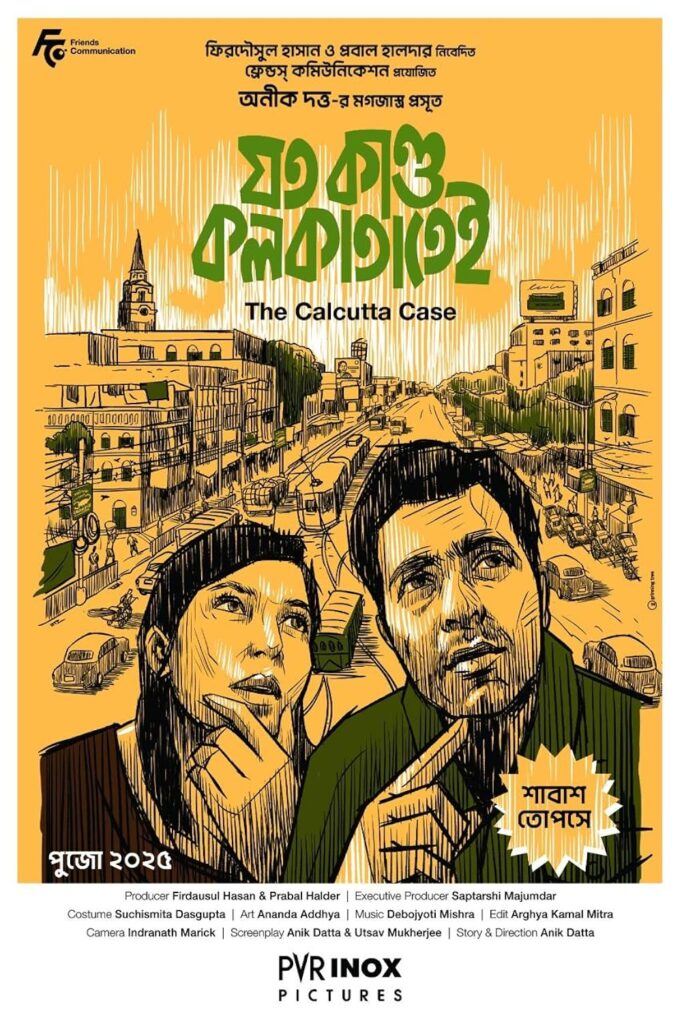Joto Kando Kolkatatei
A young detective enthusiast follows in the footsteps of legendary Bengali sleuth Feluda when a decades-old mystery resurfaces during Durga Puja, testing his skills against a puzzle that once stumped his hero.
The one thing that never leaves the film during its entire runtime is the undeniable warmth and casual charm that manages to evoke a smile throughout.
Anik Dutta is a Satyajit Ray fan; all of his films bear tribute to the master, but if a movie is barely constructed as a fan service, which is so heavy-handed, it feels like an advertisement. The film sure has the accurate flavor of a Feluda mystery, but it never really hits the suspense button, despite the film being marketed as a mystery drama.
It seems like, after the meteoric success of “Aparajito”(a film which navigates through the making of Ray’s Pather Panchali), Anik Dutta has been asked to make another film targeting the same audience, which he reluctantly accepted. Although formulaic, downright predictable, what makes the film watchable is Abir’s enigmatic screen presence, Debojyoti Mishra’s ambient background score, which uplifts many banal scenes.
The plot shifts between several timelines, locations. The way Indranath Marick shoots those scenes gives a sense of warmth and authenticity at the same time, be it the cabaret scenes of vintage Kolkata posh pubs, or in the dreamy hilly areas of North Bengal.
The dialogues bear a resemblance to Feluda novels, with frequent heritage Kolkata references, its culture, and the cultured disposition. It stays true to its influence, but becomes repetitive, which has been a constant trait of every aspect of the film.
The opening of the film sets the tone for the film early on, with the titular song playing in the background, and a seemingly mundane journey of an old envelope through different hands takes place. A McGuffin is set, a mystery is hinted at, few moments later, our protagonist also enters the screen. It is so borderline conformist in its approach that, for an attentive audience, there is no surprise in the fold; still, the frames and an uplifting musical score give a sense of nostalgia and belonging in those frames.
It is revealed by Anik Dutta in interviews pre-release that a considerable chunk of the film is directed by his cinematographer due to illness. This seems a valid reason for some scenes being so abruptly placed throughout the film; it sticks out like a sore thumb.
The character of Abir, who plays a pivotal role in the film, is given no proper buildup. The scene where he makes an entry does seem like a rabbit conjured up from a magician’s hat. The chemistry between Abir and the lead protagonist (played by Quazi Nawshaba Ahmed) doesn’t hold up either. Anik Dutta has always made his characters politically conscious or at least socially relevant in all of his films, but here the characters are a mere caricature of the cliches of a typical Bengali treasure hunt novel, with no depth whatsoever.
The performances on the board are watchable, with Abir bringing the old school Bengali sleuth charm. The film works better whenever he is on the screen. Nawshaba(Protagonist) is decent, but her character arc, although very interesting on paper with a cross-national history to dwell upon, the absence of any emotional arc preventing the audience from connecting with her character. There is hardly any scene that establishes the emotional bond between her with her mother.
Among the supporting cast, Rik Chatterjee shines. A boy recently back from his studies in Europe with a different overview of culture and restrictions is accurately portrayed by him. He has a nice screen presence.
Aparajito Ghosh Das, Anindya Banerjee, Rajat Ganguly, Mithu Chakravarty are all decent, but none of them have a significant impact on the film, although their characters contribute to various key plot points.
The songs, except the titular one, don’t work from the film’s perspective. The songs are sung well, no doubt, but the relevance is not there. Anik Dutta can place songs in the right place if u look at Bhooter bhobishyot (cult classic).
The climax, although it ends on a warm note, is underwhelming, which is kind of predictable. It doesn’t really go beyond what was hinted at in trailers, or maybe it’s a conscious decision, I don’t know.
The film, being a festival release, the banality of the film doesn’t affect the nostalgia it strives to serve to the audience. A Packed theatre, full of kids with their parents, grandparents, in a jovial mood, gets to spend time with a charming (although very surface-level) film, which is a good thing for Bengali films for sure.





